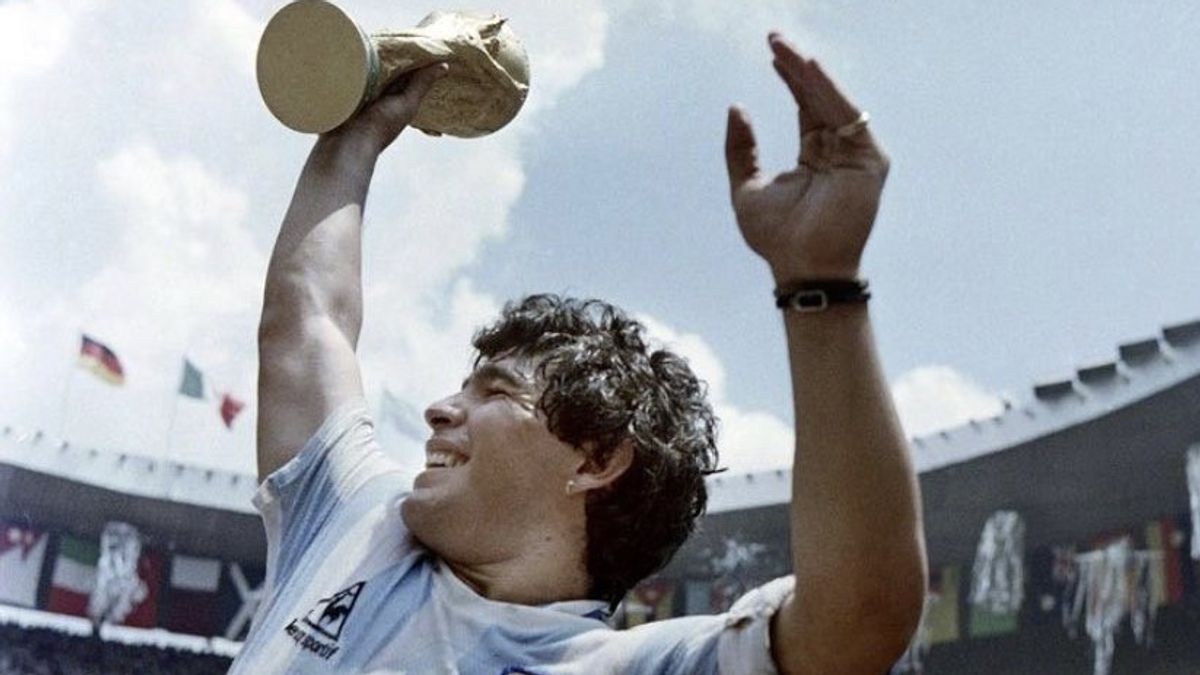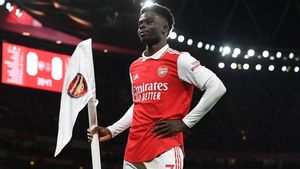JAKARTA - The Argentine people cheered when Diego Armando Maradona scored a goal against England in the quarter-finals of the 1986 World Cup in Mexico. One of his controversial goals - popularly known as the 'Hand of God' - was the absolute retaliation for Argentina, who defeated Queen Elizabeth in the Malvinas War four years earlier.
Meanwhile in other parts of the world, in Asia, especially in Indonesia, football enthusiasts are also rumbling. Although only limited to worshipers of 'idols' called glass screens. From small children to the elderly, they were amazed to see the ingenuity and cheating of Il Nostro Dio aka Our God, as he was called a citizen of Naples through TVRI, the only television channel available at that time.
Little Kiki, waking up in the early morning, accompanied his father who watched the match between Argentina and England. With eyes still filled with black and white, he stared at the 'idol' in black and white in front of him while braking himself up.
At the Azteca Stadium, Maradona did two things that were contradictory. First, he scored with his hands. Second, the megastar took a solo run past six players including goalkeeper Peter Shilton to score Team Tango's second goal. Argentina advanced to the semifinals with a score of 2-1 after Gary Lineker, an Everton player, was only able to minimize the defeat of The Three Lions.
Maradona was enough to lead the Albiceleste to victory in the quarter-finals to make everyone fall in love with him. However, when he finally succeeded in bringing the Tango Team to their second World Cup trophy, the story was certainly different.
The next day. In a muddy field, former rice fields. Kiki plays soccer with friends his age, 8 years old or grade 2 elementary school, after school. Dribbling from back to front, he repeatedly failed to hit the ball when dealing with the opponent's goal. He wants to imitate his new idol, Maradona, whom he saw the night before.
A little disappointed, Kiki came home and turned on the television. Throughout the day, he's been looking for footage of Maradona's goals scored against Peter Shilton. Budi's wait ended when he watched the program From Gelanggang to Gelanggang, a sports program at the time, and Arena and Champion after the World in News.
It's not like today's practical era with YouTube. At that time, to look for match highlights or goal footage from idol players, you had to go through television. And Kiki had to wait for hours to get what he was looking for.
Kiki returned to the former rice field field, this time in the afternoon. Reflecting on his previous failures, Kiki is determined to achieve success at a second chance. Not dribbling past many players anymore, but breaking into the opponent's goal with his hand.
In short, goals! Kiki did it successfully. He cheered, ran like an idol without realizing that the evening call to prayer - which was often used as a benchmark as a sign of the end of children's matches at that time - had sounded.
Kiki, is just one example of the millions of Maradona worshipers on planet Earth.
Maradona, god of the city of NaplesDiego Maradona, he was so respected at Napoli. His face still adorns the walls, billboards and holy places in the city of Naples even though his work had passed some 30 years ago.
In Italy, he spoke on behalf of the poor in the south of the country against the rich in the north. Not without reason, Maradona grew up in acute poverty and will always side with those who are oppressed which makes Napoli ridiculed by wealthy clubs in northern Italy who for him are the perfect team.
Few players have had such an impact on a club as Maradona did during his seven years for the Partenopei.
The club won the Scudetto A 1986-1987 and 1989-1990, the 1986-1987 Coppa Italia, the 1988-1989 UEFA Cup (now Europa League) and the 1990-1989 Supercoppa Italiana when Maradona was there. However, there is much more to this achievement than that statistic.
Maradona scored 115 goals for Napoli, including many of the best ever goals in Serie A, and set a club record that was only recently broken.
Maradona and Napoli beat northern teams such as Juventus, AC Milan and Inter Milan, which are seen as the established group of the Italian aristocracy. Maradona immediately changed Serie A.
When Maradona's Argentina team met Italy in Napoli at the 1990 World Cup, some of the home fans did the unthinkable by cheering for the South American nation. Wonderful!
In Argentina, Maradona Considered GodDiego Maradona is immortalized in various songs and a virtual "church" with 10 commandments of his own, which range from worshiping the former playmaker whose jersey number 10 earned him the nickname D10S which is a play on the Spanish word for "God".
Argentine singer Calamaro in his song Maradona revealed, Maradona is not just any human, he is a human who clings to a ball of skin. Calamaro doesn't care about the chaos of life that Maradona is going through. For him, Maradona remains a great friend and person.
The "Maradona Church" where Diego is his "Lord" and has thousands of followers around the world, includes commandments such as "Express your unconditional love to Diego and good football" and "Spread the magic of Diego throughout the universe" .
Now, Maradona is gone. The Hand of God breathed its last at the age of 60 after having a heart attack in Tigre, north of Buenos Aires, Argentina, on Wednesday, November 25 Argentine time.
As one church follower wrote on the group's Facebook page, "Football is dead. There's nothing more to say. AD10".
Maradona's Cult Exceeds Football GreatnessDiego Maradona's cult status throughout the world goes far beyond the greatness of football history itself. Penetrating continents, space, time and age. His shortcomings made him a human and his fighting nature earned him great acclaim.
Maradona is the personification of Argentina and not just because of his unmatched brilliance. His cunning, his fondness for outsmarting opponents and his deep suspicion of authority marked his way of playing football.
In a sport where gentleness prevails, Maradona is willing to speak up and the Argentinean likes him because they see a part of him in Maradona, maybe more than they admit.
His dangerous and often destructive passion is emblematic of what it means to be Argentinian where outpourings of great joy are often followed by profound melancholy musings.
Off the pitch, Maradona was full of passion and excess, a little man with great taste. She knew how to piss off other people and she didn't care what anyone thought. This behavior made him both loved and hated.
But of course, Kiki doesn't care about that. For him, Maradona is the hero of his childhood.
AD10 El Pibe de Oro ...
The English, Chinese, Japanese, Arabic, and French versions are automatically generated by the AI. So there may still be inaccuracies in translating, please always see Indonesian as our main language. (system supported by DigitalSiber.id)













